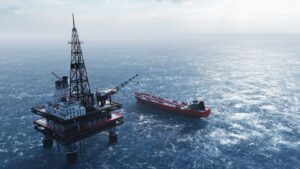The design of a ventilation system can have huge ramifications for your offshore application. Marine vessels face several unique challenges compared to onshore facilities, which the ventilation system must take into account. Additionally, vessels can be widely different from each other, making customization absolutely necessary. In this article, we’ll discuss some key things to know about marine ventilation system design.
If you need ventilation systems for onshore or offshore applications, our team at Eldridge is here to help. We are experts in industrial ventilation solutions and offer top quality system design and installation. Get in touch now to request a quote for your ventilation needs.

The Design of a Ventilation System for Marine Applications is Critical for Safety & Comfort
Ventilation in marine vessels is absolutely essential and required by many regulatory authorities. At bare minimum, all enclosed spaces require a mechanical ventilation system with intake and exhaust blowers. These centrifugal fans help keep the air clean, comfortable, and safe for occupants.
There are several reasons why ventilation is so critical for marine vessels. For instance, it’s necessary for comfort to move stale, hot air from interior spaces. This can help keep everyone cool and comfortable for marine workers.
Additionally, industrial ventilation systems in marine vessels can help control excessive moisture. Because offshore operations deal with significant amounts of moisture and humidity, this can create several issues for equipment inside the vessel. Marine “sweating” is a serious problem that can cause slips and falls, premature equipment deterioration, and may even interfere with sensitive equipment on the vessel. With proper ventilation, you can reduce the amount of moisture inside the vessel.
Finally, and most importantly, marine ventilation systems are critical for safety. Engine exhaust often contains toxic chemicals and gases. When inhaled, they can cause serious health problems and even death. Carbon monoxide is one example of chemicals found in engine exhaust fumes that can quickly cause sickness and death. The ventilation system can help remove air contaminated with these fumes from spaces on the vessel to reduce the risks of health issues. Therefore, good design of a ventilation system for vessels is absolutely critical for health and safety on board.
Key Considerations for Marine-Duty Industrial Ventilation Systems
There are many elements of proper marine ventilation system design. For instance, ensuring that exhaust and intake systems are properly rated for the amount of air inside a space. This means using advanced calculations and software for the design of a ventilation system inside a marine vessel.
Additionally, basically all the industrial fans and ventilation equipment will need to be explosion proof. This is to reduce the risk of sparks that can cause fires on the vessel, as offshore fires can be absolutely devastating.
Also, keep in mind that your vessel may need other types of equipment based on the exact conditions. For instance, many marine applications require dehumidifiers. We also often recommend our Storm Guard Hoods, which help protect equipment from water. These are just a few examples of the different types of equipment you may require for your vessels.
Customized Ventilation Solutions from Eldridge
Our team at Eldridge has the expertise necessary to create safe, effective ventilation systems for the marine industry. We practically pioneered offshore ventilation and offer proprietary products designed specifically for marine vessels, including our Storm Guard Hoods and ENJET systems. Trust our team to handle all aspects of ventilation system design and installation – contact us now for a free quote.
